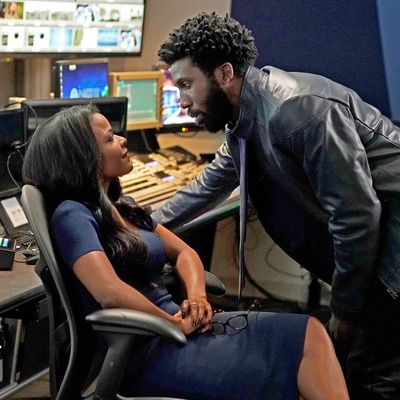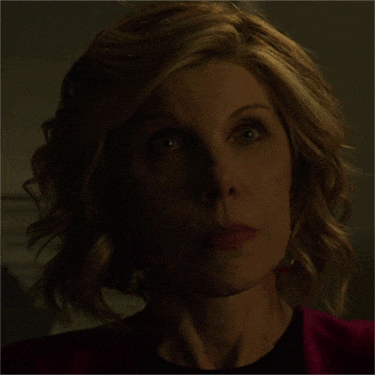
One of the big revelations of the #MeToo movement has been discovering how much nondisclosure agreements, or NDAs, have functioned like the lids on barrels of toxic waste, concealing corporate abuse at the highest level. So pervasive are NDAs that Donald Trump brought them into the White House, ostensibly to prevent leaks, even though they’re constitutionally dubious and almost certainly unenforceable. NDAs create a legal fortress that’s nearly impossible to breach, giving abusers like Harvey Weinstein the power to silence victims through draconian settlements. They’re weaponized bureaucracy, sheathed discreetly in little red folders like the ones passed around on tonight’s fiendishly clever episode of The Good Fight.
They’re also commonly accepted. When Adrian Boseman calls an agreement to cover all sexual-harassment charges “standard CEO protection,” it sounds nefarious to the lawyers at Reddick, Boseman & Lockhart, who are managing the fallout over the sexual misconduct of one of the firm’s founders, the late Carl Reddick. Reddick was a civil-rights hero, and his name and legacy are the bedrock of a firm that’s mostly African-American and prides itself on a commitment to social justice. The distance between the firm’s principles and its concessions to high-paying clients has been an ongoing source of tension on The Good Fight, which is a show about the difficulties these flawed people face in being their best selves. And “The One About the Recent Troubles” is a typically nuanced and entertaining hour about the ugly process of setting things right. Or maybe not setting them right, after all.
The ingenious catalyst for this entire mess is a video intended to promote the firm’s website. “You’re African-American,” the producer tells Adrian and Liz. “That’s your brand.” And Carl Reddick, Liz’s father, is considered the best possible avatar of that brand — African-American, yes, but also a man who brought his civil-rights activism into the legal realm. Asked by Marissa and Jay to say some kind words about what it was like to work with the icon, Reddick’s former secretary breaks down in tears — she can’t bring herself to speak in platitudes about a man she knew as flawed at best, monstrous at worst. And when a stenographer comes forward with her own claim of sexual abuse at Reddick’s hands, the firm immediately goes into damage-control mode. The Reddick name accounts for 40 percent of its business, by one estimate, and revelations about his sexual misconduct are an existential threat to the business.
And so The Good Fight goes barreling into extremely sensitive territory with its usual élan, and comes away with a nuanced take on how individuals and institutions handle a compromising situation. For her part, Liz chooses to face the painful accusations against her father head-on, despite strenuous efforts to keep her in the dark. She has chosen to waive the tacit NDA that’s been drafted for her protection, choosing instead to represent the firm in its dealings with her father’s victims and to enlist Marissa in tracking down any other women who had such an encounter with her dad. She wants to know her father for who he really was, and she wants to know more about the office culture that allowed him to get away with rape behind closed doors. Adrian claims to have installed glass walls to curb what he believed to be Reddick’s extramarital affairs, but the fact remains that some inappropriate behavior was known to have been taking place. It was just an open secret, like the ones that had trailed Weinstein, Bryan Singer, Charlie Rose, and all those other guys for years.
“The One About the Recent Troubles,” written by co-creators and show runners Michelle and Robert King, ekes as much fun out of a serious subject as possible without veering into tastelessness. Following last season’s wonderful Schoolhouse Rock–style impeachment primer, the show has again turned to Jonathan Coulton to provide the ditty for an animated bit on NDAs, with couplets like, “Financial details, shameful stories, favorite breakfast food / Just list the things that if they talk about them they get sued.” The Kings also have Diane heading to an underground parking deck for clandestine meetings with one of the “ND-eights” that Donald Trump has under a confidentiality agreement. She believes that faulty language in the contract will allow one of Trump’s women to disclose the fact that he paid for her abortion, undercutting his support from the religious right. (Given Jerry Falwell Jr.’s real-life assessment of Trump’s moral shortcomings, that might be wishful thinking on her part.)
But the irony of Liz and company’s quest to confront the firm’s dark past is that they’re all motivated to keep it under wraps. Reddick, Boseman & Lockhart can’t afford to lose business over its founder’s misconduct, so they’re forced to smother it in paperwork, too. (The final shot, a pan up to a folder after the partners toast “to new beginnings,” is a real masterstroke.) One interesting wrinkle is that both of Reddick’s accusers seem content with the settlements, not just because the payout is fair, but because the better part of the man’s legacy deserves protection. There’s something dramatically convenient about their acquiescence, because we’re relieved from thinking of Liz, Adrian, and the others as perpetuating monstrous behavior. But the Kings also appear to be referencing another King, Martin Luther, whose womanizing has been used to sully his reputation. This goes beyond womanizing, of course, but there’s some thought here about the social cost of telling the full truth about Reddick’s past.
“You know what we are?” asks Liz, in the final scene. “We are a firm with no past. Not anymore. We’re starting over.” Here’s to NDAs for making it possible.
Hearsay
• It’s my firm belief that The Good Fight would be the most meme-d show on television if more people were watching it. To that end, I’m including the
“GIF of the Week” in every recap. This week, here’s Diane’s reaction to Kurt telling her that he’s been shooting with Eric Trump and Donald Trump Jr.:
• The batshit craziness doesn’t end with Kurt’s side gig with the Trumps. His safari trip also gets cut short when one of the Trump boys accidentally hits him with buckshot, much like Dick Cheney did to 78-year-old rancher Harry Whittington, who later apologized for getting shot. But wait, it gets nuttier: The buckshot wound speaks to Diane in Trump’s voice. Because that’s the sort of thing that happens on The Good Fight.
• Rose Leslie is a problem the show still can’t quite solve. Her character, Maia Rendell, came to the firm in the wake of a Bernie Madoff-esque scandal that tarnished her family’s reputation— and by extension hers, and by further extension the firm’s. But as that scandal has faded into the rearview — albeit not enough for the partners to want her removed from the website — Maia hasn’t carved out a particularly compelling space on the show. This week’s subplot about her scratched corneas felt notably superfluous.
• Diane scrolling through a Netflix-like streaming service, trying to figure out “whether to watch a German series about serial killers or a Scandinavian series about serial killers,” was the most universally relatable moment on tonight’s episode.





